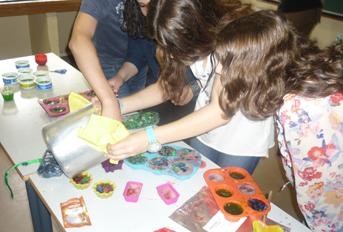Associação Portuguesa de Investigação em Cancro
Antimicrobial, antitumor and anti-Inflammatory properties of portuguese plants: an educational hands-on project with portuguese students
Antimicrobial, antitumor and anti-Inflammatory properties of portuguese plants: an educational hands-on project with portuguese students

Promoting environmental and health education is crucial to allow students to make conscious decisions based on scientific criteria. The study is based on the outcomes of an Educational Project implemented with Portuguese students and consisted of several activities, aiming to investigate the antibacterial, antitumor and anti-inflammatory properties of plant extracts from autochthones Portuguese plants, with posterior incorporation in soaps and creams. The effectiveness of the project was assessed via the application of a questionnaire (pre- and post-test) and observations of the participants in terms of engagement and interaction with all individuals involved in the project. This project increased the students’ knowledge about autochthonous plants and the potential medical properties of its extracts, increased awareness about the correct design of scientific experiments and highlighted the importance of using experimental models of disease. The students involved regarded their experiences as exciting and valuable and believed that this project helped to improve their understanding and interest on these subjects. This study emphasizes the importance of raising students’ awareness on the valorization of autochthonous plants and the exploitation of their medicinal properties.
This is an innovative project, whose aim is to create a new scientific, innovative and entrepreneurial model to encourage pro-active students and prepare them for the challenges of globalization.
Authors and Affiliations:
Maria-Manuel Azevedo 1,2,*, Céline Pinheiro 3,4,5,6, Alberto C. P. Dias 7, Filipa Pinto-Ribeiro 3,4 and Fátima Baltazar 3,4
1 School D. Maria II, Rua da Alegria, 4760-067 Vila Nova de Famalicão, Portugal
2 Department of Microbiology, Faculty of Medicine, University of Porto, 4200-319 Porto, Portugal
3 Life and Health Sciences Research Institute (ICVS), School of Health Sciences, University of Minho, 4710-057 Braga, Portugal.
4 ICVS/3B’s-PT Government Associate Laboratory, 4710-057 Braga/Guimarães, Portugal
5 Barretos School of Health Sciences, Dr. Paulo Prata—FACISB, 14784-400 Barretos, São Paulo, Brazil.
6 Molecular Oncology Research Center, Barretos Cancer Hospital, Pio XII Foundation, 14784-400 Barretos, Brazil.
7 Center for the Research and Technology of Agro-Environmental and Biological Sciences (CITAB), Department of Biology, University of Minho, Campus de Gualtar, 4710-057 Braga, Portugal;
Abstract:
Promoting environmental and health education is crucial to allow students to make conscious decisions based on scientific criteria. The study is based on the outcomes of an Educational Project implemented with Portuguese students and consisted of several activities, exploring pre-existent Scientific Gardens at the School, aiming to investigate the antibacterial, antitumor and anti-inflammatory properties of plant extracts, with posterior incorporation in soaps and creams. A logo and a webpage were also created. The effectiveness of the project was assessed via the application of a questionnaire (pre- and post-test) and observations of the participants in terms of engagement and interaction with all individuals involved in the project. This project increased the knowledge about autochthonous plants and the potential medical properties of the corresponding plant extracts and increased the awareness about the correct design of scientific experiments and the importance of the use of experimental models of disease. The students regarded their experiences as exciting and valuable and believed that the project helped to improve their understanding and increase their interest in these subjects and in science in general. This study emphasizes the importance of raising students’ awareness on the valorization of autochthonous plants and exploitation of their medicinal properties.
Journal: International Journal of Environmental Research and Public Health
Link: http://www.mdpi.com/1660-4601/12/3/2437




